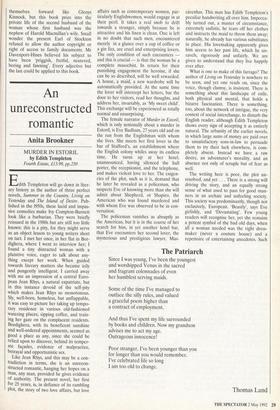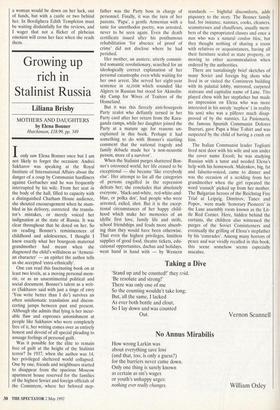An unreconstructed romantic
Anita Brookner
MURDER IN ESTORIL by Edith Templeton Fourth Estate, f13.99, pp.250 Edith Templeton will go down in liter- ary history as the author of three perfect novels, Summer in the Country, Living on Yesterday and The Island of Desire. Pub- lished in the 1950s, these lucid and impas- sive comedies make Ivy Compton-Burnett look like a barbarian. They were briefly reissued in the 1980s but are still too little known: this is a pity, for they might serve as an object lesson to young writers short on tact. I met her once, in her flat in Bor- dighera, where I went to interview her; I found a tiny distracted woman with a plaintive voice, eager to talk about any- thing except her' work. When guided towards literary matters she became icily and pungently intelligent. I carried away with me an impression of a central Euro- pean Jean Rhys, a natural expatriate, but in this instance devoid of the self-pity which makes Jean Rhys so monotonous. Sly, well-born, homeless, but unflappable, it was easy to picture her taking up tempo- rary residence in various old-fashioned watering places, sipping coffee, and train- ing her gaze on the complacent residents. Bordighera, with its beneficent sunshine and well-ordered appointments, seemed as good a place as any, since she could be relied upon to discover, behind its temper- ate façades, evidence of malpractice, betrayal and opportunistic sex.
Like Jean Rhys, and this may be a con- tradiction in terms, she is an unrecon- structed romantic, hanging her hopes on a man, any man, provided he gives evidence of authority. The present novel, her first for 25 years, is, in defiance of its rambling plot, the story of two love affairs, but love affairs such as contemporary women, par- ticularly Englishwomen, would engage in at their peril. It takes a real snob to drift towards a stranger, simply because he is attractive and his linen is clean. One is left in no doubt that such men, encountered merely in a glance over a cup of coffee or a gin fizz, are cruel and enterprising lovers. The only condition of such encounters and this is crucial — is that the woman be a complete masochist. In return for their punishing engagement the heroine, if she can be so described, will be well rewarded. A house, a maid, a new wardrobe will be automatically provided. At the same time the lover will intercept her letters, bar the door to her visitors, read her thoughts, and address her, invariably, as 'My sweet child'. This exchange will be experienced as totally normal and unsurprising.
The female narrator of Murder in Estoril, which is only notionally about a murder in Estoril, is Eve Badham, 27 years old and on the run from the Englishman with whom she lives. She meets her first lover in the bar of Stafford's, an establishment where the English colony whiles away its endless time. He turns up at her hotel, unannounced, having silenced the hall porter, the receptionist, and the telephone, and makes violent love to her. The exigen- cies of the plot, such as it is, demand that he later be revealed as a policeman, who suspects Eve of knowing more than she will admit about Shepherd, or Shapiro, the American who was found murdered and with whom Eve was observed to be in con- versation.
The policeman vanishes as abruptly as the American, but it is in the course of her search for him, in yet another hotel bar, that Eve encounters her second lover, the mysterious and prestigious lawyer, Mas-
crenhas. This man has Edith Templeton's peculiar handwriting all over him. Impecca- bly turned out, a master of circumstance, extremely sadistic, he tears off her clothes and instructs the maid to throw them away; naturally, he already has various substitutes in place. His lovemaking apparently gives him access to her past life, which he un- ravels, rigorously and unfairly. We are given to understand that they live happily ever after.
What is one to make of this farrago? The author of Living on Yesterday is nowhere to be seen, and yet one reads on, since the voice, though clumsy, is insistent. There is something about this landscape of exile, both physical and mental, that holds a bizarre fascination. There is something, too, about the network of intrigue, the very context of social interchange, to disturb the English reader, although Edith Templeton shows every sign of accepting it as entirely natural. The urbanity of the earlier novels, in which large sums of money are paid over to unsatisfactory sons-in-law to persuade them to try their luck elsewhere, is com- pletely absent. Instead we have a raw desire, an adventurer's morality, and an absence not only of scruple but of fear as well.
The writing here is poor, the plot un- resolved, and yet . . . There is a strong will driving the story, and an equally strong sense of what used to pass for good man- ners in an archaic and unfeeling society. This society was predominantly, though not exclusively, European. 'Beastly', says Eve girlishly, and 'Devastating'. Few young readers will recognise her, yet she remains a potent symbol of the bad old days, when all a woman needed was the right dress- maker (never a couture house) and a repertoire of entertaining anecdotes. Such a woman would be down on her luck, out of funds, but with a castle or two behind her. In Bordighera Edith Templeton must be waiting disdainfully for the reviews, and I wager that not a flicker of plebeian emotion will cross her face when she reads them.



















































 Previous page
Previous page